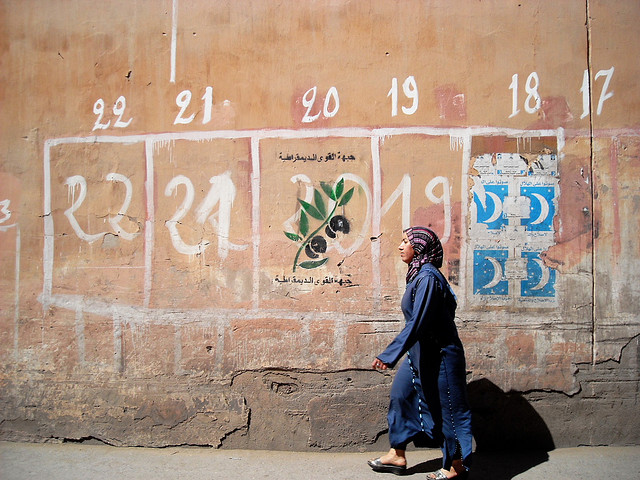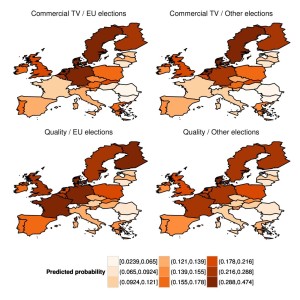“Horse-race” coverage of elections is most common in polarised party systems in close electoral contests
What causes ‘horse-race’ coverage of electoral contests? Drawing on data from 160 different European print and broadcast outlets in 27 different countries at three different points in time, Chris Hanretty finds that this kind of electoral coverage is most frequent in polarised party systems with close electoral contests, and in large markets with professional journalists – findings which challenge the traditional view of horse-race journalism as a ‘low-quality’ form of news.

Credit: Vensa Middelkoop, CC BY 2.0
I like opinion polls as much as the next person.
No, scratch that — I like opinion polls much more than the next person. I collect them, aggregate them, and make predictions using them. No matter what I tell myself, I have to realize that that’s not normal.
Yet even I realize that sometimes, it would be better to have fewer opinion polls and more coverage of substantive issues. Although there are now a number of services aggregating polling in the run up to the General Election, it might be nice to know a bit more about the parties’ stances on deficit reduction, and a bit less on whether UKIP will end up with eleven or eleventy-hundred MPs.
That way of describing the issue assumes that polls are somehow crowding out in-depth coverage of the issues — that every minute or column-inch dedicated to scrutinizing the latest release from Ipsos-Mori or YouGov is a minute less dedicated to scrutinizing campaign promises. If you assume that, there’s a naturally tendency to think that it’s only low-quality media outlets that use polls, and that high-quality media — those that cater to well-educated readers and viewers who care about politics — are more likely to avoid polling.
It turns out that this picture isn’t true. In a recent article on the use of horse-race coverage of elections — basically, any story that mentions a poll, and thereby frames coverage in terms of electoral winners and losers — Susan Banducci and I find that it’s high-quality outlets which are most likely to cover politics as a horse-race.
We’re able to reach that conclusion because we analysed the probability of a given news item featuring a reference to an opinion poll in more than eighty thousand stories in 160 different European print and broadcast outlets in 27 different countries at three different points in time. We find that horse-race coverage is most frequent in polarized party systems with close electoral contests, and in large markets with professional journalists. These findings challenge the traditional view of horse-race journalism as a ‘low-quality’ form of news. This is still true even when we control for the different propensity of outlets to cover `political’ stories. In other words, it’s not the case that high-quality outlets cover more polls because they cover more politics.
You can see our predictions for different countries and different types of outlet in the graphic below.
Of course, “quality” is only one of many variables affecting the level of horse-race coverage. It’s natural to think that polls are more useful the closer the election is. After all, if the election is a blow-out, polls are only ever going to tell you the magnitude of victory, which is much less interesting. Similarly, if the election is a contest between a smaller number of very polarized parties, we would expect polls to be used more. If the election is a contest between Tweedledum and Tweedledee, polls are less interesting. Indeed, this is exactly what we find.
Finally, there are some market-level variables which affect the level of horse-race coverage. The larger the market — in practice, the larger the population of a country — the more likely polls are to feature. This is really just due to some of the start-up costs in the polling industry, which is always going to be deeper in Germany than it is, say, in Luxembourg. Interestingly, however, the more competitive the market, the lower the use of polls. This does actually make sense if we think of polls as a flag-ship product, reported on by high-quality outlets as part of broader current affairs reporting: if competition drives quality down, and pushes news out in favour of other stories, then we should expect competition to limit the space for horse-race journalism.
So if you want to cocoon yourself from polls in the election campaign — and I can’t imagine why you would — do yourself a favour, and swear off the Financial Times and the BBC, and start reading the Sun and watching Channel 5 instead. You’ll get a lot less coverage of politics in general — and almost no coverage of opinion polls.
—
Note: this is an extended version of a post which appeared on the University of East Anglia’s ‘Eastminster’ blog. This article gives the views of the author, and not the position of Democratic Audit UK or the LSE. Please read our comments policy before posting.
—
 Dr Chris Hanretty is a Lecturer at the University of East Anglia
Dr Chris Hanretty is a Lecturer at the University of East Anglia






 Democratic Audit's core funding is provided by the Joseph Rowntree Charitable Trust. Additional funding is provided by the London School of Economics.
Democratic Audit's core funding is provided by the Joseph Rowntree Charitable Trust. Additional funding is provided by the London School of Economics.
Excellent piece. Sneering at ‘horse-race’ coverage ignores the importance of voters knowing how the rest of the electorate are thinking. It also informs on how voters can behave tactically. Finally, anything that generates interest in electoral politics is surely a good thing. Banning opinion polls, or their reporting as some have advocated, is a bit North Korean.
‘Horse-race journalism’ on elections (lots of polls) not a ‘low-quality’ form of news & more likely in tight contests https://t.co/vemO3gzMnO
“Horse-race” coverage of elections is most common in polarised systems in close contests https://t.co/Vtld0bOYtv https://t.co/BR4aToWeel
“Horse-race” coverage of elections is most common in polarised party systems in close electoral contests https://t.co/vzhLLSZzsJ